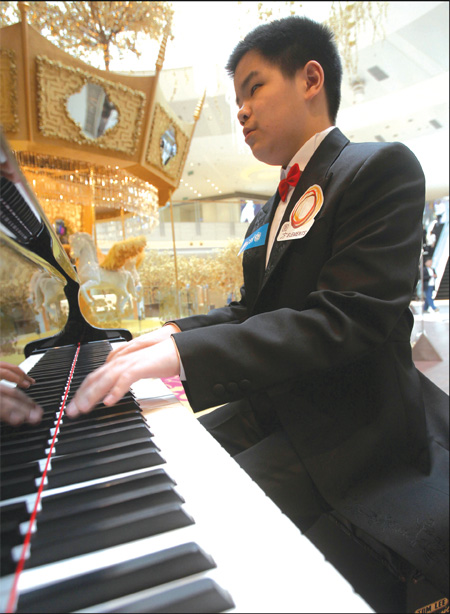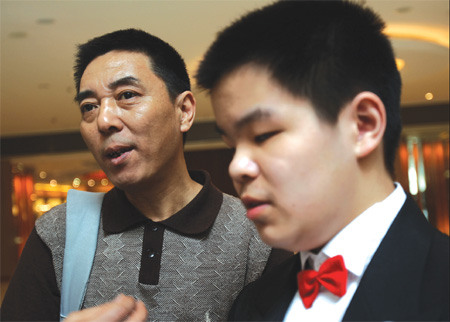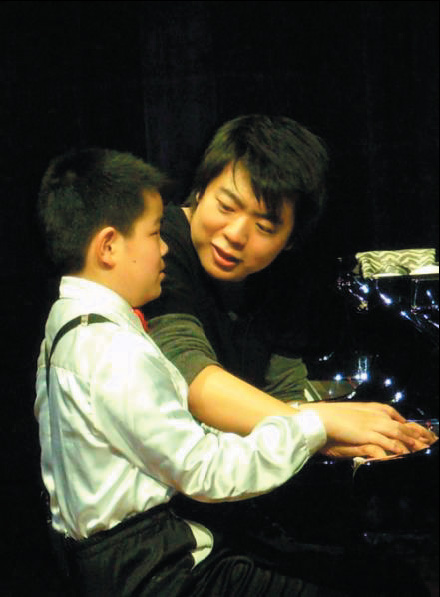An ear magically in touch
Updated: 2010-04-17 07:47
By Joy Lu(HK Edition)
|
|||||||||
Visually impaired music prodigy Lai Jiajun so impressed pianist Lang Lang that he called him 'a little master' Joy Lu retraces the boy's path in his pursuit of music
The excitement on Lai Jiajun's face as he ran his fingers over the buttons of his new MP3 player was typical of any 14 year old. "What is this button for?" he asked his father, his voice full of enthusiasm. Lai has been blind since infancy.
Even if he had no visual impairment, anyone hearing him play on the piano would be struck by his extraordinary ability.
His explanation for how he became an accomplished pianist before the age of 14 is simply, "Interest is the keyword," he said in English.
The American accent in his spoken English was inflected so well listeners might believe him to be a native speaker. He has never left China. He learned most of his English listening to recordings and English radio programs, the same way he learned to play the piano.
A prodigy
Lai Jiajun was born almost three months prematurely - in 1996 in Xiaoshan, Zhejiang Province. The 1.13 kg infant had to be kept alive in an incubator for more than two months. He survived. But the high concentration of oxygen in the incubators left him with retinopathy of prematurity, a condition resulting in blindness.
His musical aptitude began emerging when he was three. His father Lai Gehong bought him a toy electronic keyboard for his birthday. Lai Jiajun fell in love with it. He played it day and night, pressing each key over and over until he had memorized its correspondence to a musical note. One day, his father found the toddler playing the melody to a song he heard on television.
Music lessons, were out of the question. The Lais had been laid-off from their jobs. The family's savings had been drained by medical bills. They couldn't afford a real electronic keyboard. With their scant resources, they bought music tapes for Lai Jiajun to hear. Learning to play by ear, the toddler soon had a repertoire of more than 200 pieces.
Soon the little boy reached the creative limits of the toy keyboard. In the meantime he had discovered the beauty and nuance of music played on the piano.
Lai Gehong arranged for the family to make regular visits to friends who owned pianos, so Lai Jiajun could play while the adults chatted. These visits were never long enough for the boy. Often, he had to be carried away from the bench unwillingly, when it was time for the family to leave.
The piano visits continued until 2000, when Lai Jiajun was taken to a musical instrument shop owned by Han Weinan. The four-year-old boy played the piano for Han and his staff. His playing was untrained and without grace but the ardor on his face touched his audience.
Han told the boy that he could play in the showroom anytime. Later that same year, the shop owner gave Lai Jiajun a piano valued at 10,000 yuan.
"I'm lucky. So many people have helped me," Lai Jiajun said, beaming his trademark sunny smile.
Journey to Beijing
Lai Jiajun's musical talent is unmistakable. It was difficult to find a good teacher willing to take a blind pupil. For a long time, Lai Jiajun learned from the free lessons given him by friends and from recordings by piano masters.
In 2004, Lai Gehong took Lai Jiajun to Beijing seeking guidance from Zhou Guangren, a respected music educator whom Lai Gehong had read about in newspapers.
The former Piano Department dean of the Central Conservatory of Music found Lai Jiajun lacking in a solid foundation for a piano career. Still she was touched by the boy's story and promised to find a teacher for Lai Jiajun if the family moved to Beijing.
Lai Gehong said it was one of the most difficult decisions the family had to make. They had no money. They knew nobody in Beijing except Zhou. Where would they live? Could they find jobs to pay for the boy's education?
Still, the intrepid parents moved to Beijing in August 2005. The mother found a job for migrant workers. The father devoted his time to helping with Lai Jiajun's studies. "My wife knew even less about music than me," he said.
Zhou made good on her promise. She arranged for one of her students to teach Lai Jiajun. The 77-year-old music professor undertook a special visited to the factory of Beijing Xinghai Piano Group Co to choose a piano, which was given to Lai Jiajun as a gift.
Lai Jiajun made fast progress in his studies in Beijing. On January 4, 2008, he attended an open class by pianist Lang Lang at the National Centre for the Performing Arts.
Lai Jiajun was chosen as one of five young students to come up to the stage for free lessons. His skill and cheerful manner won Lang's heart. He invited Lai Jiajun to play a piano duet.
"What shall we play?" Lang asked.
"You play, and I'll follow," Lai Jiajun answered, confidently.
They played Antonin Dvorak's Slavonic Dances, evoking a thundering ovation from the audience.
"Mr Lai, you're a little master," declared Lang Lang.
Lai Jiajun now separates his time between attending a school for the blind and the Attached Middle School to the Central Conservatory of Music. The elite school admitted only 16 piano students out of thousands of applicants from all over last year.
Lai has also been chosen as a beneficiary of the Sunshine on the Fingers Foundation, a charity Lang newly set up to benefit blind youths in their pursuit of music.
But Lai Gehong has declined financial aid for the time being: "We can manage in the current stage. We only hope that the foundation can provide assistance if Jiajun proves good enough to receive further music training overseas," he said.
"Many people need help. We know this because we wouldn't have come this far without the help from others," he said.


|
From Top: Lai Jiajun gives a recital; Jiajun and his father Lai Gehong; world-renowned Chinese pianist Lang Lang encourages Jiajun to reach new heights in playing music. Provided to China Daily |
(HK Edition 04/17/2010 page4)
